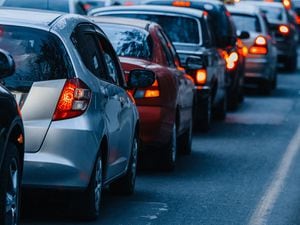EU referendum: PM responds to Express & Star readers' Brexit questions
The Prime Minister has responded to calls for a full and frank debate over the EU by answering Express & Star reader's questions on the upcoming referendum.
Kashmire Hawker, 18, from Low Hill, Wolverhampton. Student: The confidence of the nation won't be on your side if Britain votes for Brexit. If the Remain side loses will you resign? And if you state 'no', what are the reasons for you refusing?
The Prime Minister: No. I made a commitment three years ago that I would renegotiate our position in the European Union and put the vote to the public on whether Britain should remain in. I am now seeing through that commitment.
I fully believe the Black Country, the whole of the West Midlands region and indeed all of the UK will be safer, stronger and better off in a reformed EU. Leaving would risk our finances and security, and would be a leap in the dark. But as I have made clear, I will implement whatever decision the country makes on June 23.
John Davenport, 68, from Wolverhampton. Retired: In my opinion, unfettered immigration from Europe is wrecking working class areas of Wolverhampton, especially for our children and grandchildren. How can we prevent this without voting to leave the EU?
PM: People in Wolverhampton have very legitimate concerns about the effects that immigration from the EU has had on their communities. That is why I negotiated a deal to tackle the drivers in our welfare system that attract EU nationals.
I feel strongly about the need to end the something for nothing welfare for migrants. So I've made sure new arrivals from the EU will not be able to get access to full benefits for four years and child benefit will no longer be sent home at UK rates.
This government has also reformed benefits, healthcare and housing rules so those coming from the EU who haven't found work within six months can now be required to leave. Migrants also cannot qualify for social housing or housing benefits as soon as they arrive.
Steve McGee, from West Bromwich, 61, part time host at Birmingham's ICC: Why would Brexit threaten UK jobs? I can't believe other countries would refuse to continue trading with us should we exit the union.
PM: The problem is that voting to leave the EU would create years of uncertainty and disruption, which could well lead to a fall in investment and cost us jobs.
More than three million jobs in the UK are linked to exports to the EU – including 250,000 in the West Midlands. The full access we have to the European single market of 500 million people is the best free trade deal of all – and better than anything we would get outside the EU. It brings jobs, investment, lower prices and financial security.
Those campaigning to leave keep arguing that they'll negotiate a new deal, but there's a huge flaw in that argument. Why would the EU offer us a better deal than they have for themselves?
The leave campaign has not been able to explain the shape of any deal, nor how long it would take to negotiate.
John Taylor, 75, from Devon (formerly of Wednesbury, Darlaston and Willenhall). Retired: The EU is an unelected bureaucracy. Would we not be better off taking control of all of our affairs as a country?
PM: Our special status within the EU gives us the best of both worlds – staying in the parts that work for us and out of the parts that don't.
Staying in a reformed version of the EU means we get to keep full access to the Single Market of 500 million people, leading to more jobs, more investment and lower prices.
But we will never be part of an EU super-state. We will also never join the Euro, take part in Eurozone bailouts or join the passport-free no borders area.
John Cotgrave, 73, from Oldbury. Retired: What is stopping the EU from ignoring or reneging on the reforms you agreed as part of your negotiation if Britain votes to remain?
PM: The deal I have negotiated is "legally binding and irreversible", as the President of the European Council Donald Tusk said himself in February. We have also passed a Referendum Act to make sure that no powers can be handed to Brussels without the explicit consent of the British people in a referendum.
Barry Sealeaf, 56, from Stourton, Staffs: We are principal members of NATO, we are a permanent member of the UN Security Council, and we are a nuclear armed country. Can you please explain how the UK would be safer in the EU than outside it?
PM: Leaving the EU would, without question, risk our national security. Currently, we exchange vital information on terrorism and crime with our EU partners and we benefit from the European Arrest Warrant, enabling us to extradite wanted criminals from other member states.
Also, the French have co-operated with us at Calais by tackling illegal immigrants trying to get into Britain.
Remaining in a reformed Europe will make us safer because we'll have strength in numbers and can keep working with other countries to fight crime and terrorism, as well as keep our borders secure.
The leave campaign have not been able to provide an answer as to what our future security would look like if we were no longer part of the EU. And, if we leave, we don't know what would happen to the many agreements we have, including the crucial issue of whether our border would be moved from Calais to Dover.
Rachel Cornes, 28, from Cannock. Sales assistant: Forecasts that Britain would suffer economically by not adopting the Euro as our currency have not materialised. Why should we believe that the Treasury's recent figures are any different?
PM: I was never in favour of us joining the Euro – but leaving the EU altogether is a completely different proposition.
Treasury analysis shows that our country will be permanently poorer if we leave the EU – to the tune of £4,300 per household. The Treasury used well-established techniques as well as outside analysis to reach this estimate.
All the evidence clearly shows that an economy that is less open – one that trades less and has less foreign investment – will end up being less productive.
John Smith, 78, from Stourbridge. Retired: Can you please explain how the 'reformed' EU will differ from the current EU?
PM: The deal I have negotiated gives us the best of both worlds.
We get to keep full access to the single market of 500 million people, while retaining a say over the rules of doing business across Europe. For families and workers in the Black Country and West Midlands – the Engine Room of Britain with a manufacturing history that has played such in a key role in the prosperity of our country – that means more jobs, lower prices and financial security.
It also means full access to the single market for key employers such as Jaguar Land Rover, the services and retail industries, and many other businesses.
But in the reformed EU, we are permanently out of "ever closer union", we will never be part of a European superstate and we have tackled head on the drivers that attract migrants to Britain such as unfettered access to our welfare system.
Our task of reforming the European Union should not end with the referendum, however, and we will continue to pursue ways in which the EU needs to improve.
John Jarvis, 52, from Darlaston. Checkout assistant: Why do we pay so much money to the European Union to be a member? Surely that money would be better spent in our own country on the likes of social housing and the homeless.
PM: It's really not that simple, because we have a far stronger economy from being inside the EU. Currently 100,000 British businesses export to the EU and our trade with Europe is worth more than £500 billion a year.
It's only with a strong economy that we have been able to, for example, double the housing budget to help bring one million new homes, invest £8 billion to deliver 400,000 affordable houses by 2020/21 and put aside £500 million over the next four years to tackle homelessness.
If we left the EU and wanted to trade with them, we would still have to pay into the EU budget and any deals would involve accepting free movement.
Chris Fantom, 67, from Dudley. Health and Safety consultant: The Human Rights Act has caused a lot of upset over the years as in my opinion it seems to have mainly benefited the criminals and terrorists. Is reform achievable if we stay in the EU?
PM: This is a good question – because I agree it is outrageous that foreign criminals convicted of serious crimes here in Britain have been able to argue in the courts that they have, for example, a "right to a family life".
But the fact is that, on this issue, the EU isn't the problem. It was Labour's Human Rights Act of 1998 that opened the human rights framework up to abuse, and we need to do something about it.
We are proposing to repeal that law and instead bring forward a new Bill to prevent genuine abuse of human rights, instilling common sense back into the system. We will fully consult on proposals before introducing legislation – but whether we stay in the EU or leave, we are dealing with this.
We committed to reforming the UK human rights framework and this will not change, whatever the outcome of the referendum.





